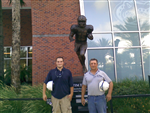Choosing the Right Home Inspector
By Tim LeMay
You have recently been crunching the numbers, negotiating offers, adding up closing costs, shopping for mortgages, and trying to get the best deals. Don't stop now. Don't let your real estate agent, a "patty-cake" inspector, or anyone else talk you into skimping here. InterNACHI-certified inspectors perform the best inspections by far.
InterNACHI-certified inspectors earn their fees many times over. They do more, they deserve more, and -- yes -- they generally charge a little more.
Do yourself a favor... and pay a little more for the quality inspection you deserve.
The licensing of home inspectors only sets a minimum standard. Much like being up to code, any less would be illegal. Imaginary people, children, psychics (who claim to "sense" if a house is OK) and even pets can theoretically be home inspectors. InterNACHI, the International Association of Certified Home Inspectors, front-ends its membership requirements.
InterNACHI inspectors:
• Have to pass InterNACHI's Online Inspector Examination, and re-take and pass it every three years (it's free and open to everyone, and free to re-take);
• Have to complete InterNACHI's online Code of Ethics Course (free to take after joining, and self-paced);
• Have to take InterNACHI's online Standards of Practice Course (free to take after joining, and self-paced);
• Must submit a signed Membership Affidavit;
• Substantially adhere to InterNACHI's Standards of Practice;
• Abide by InterNACHI's Code of Ethics;
• Have to submit four mock inspection reports to InterNACHI's Report Review Committee (for free) before performing their first paid home inspection for a client if the candidate has never performed a fee-paid home inspection previously;
• Within the first year of membership, have to successfully pass the following free online, accredited, and self-paced courses and exams:
- InterNACHI’s "Safe Practices for the Home Inspector" course,
- InterNACHI’s "25 Standards Every Inspector Should Know" course,
- InterNACHI’s "Residential Plumbing Overview for Inspectors" course,
- InterNACHI’s "How to Perform Residential Electrical Inspections" course,
- InterNACHI’s "How to Perform Roof Inspections" course,
- InterNACHI’s "How to Inspect HVAC Systems" course,
- InterNACHI’s "Structural Issues for Home Inspectors" course,
- InterNACHI’s "How to Perform Exterior Inspections" course,
- InterNACHI’s "How to Inspect the Attic, Insulation, Ventilation and Interior" course,
- InterNACHI’s "How to Perform Deck Inspections" course,
- InterNACHI’s "How to Inspect for Moisture Intrusion" course, and
- InterNACHI’s "How to Inspect Fireplaces, Stoves, and Chimneys" course.
• Have to pursue inspection-related training by taking 24 hours of additional accredited Continuing Education each year;
• Have to maintain their Online Continuing Education Log (free), per InterNACHI's rigorous Continuing Education policy;
• Have access to InterNACHI's Message Board for exchanging information and tips with colleagues and experts;
• Have access to InterNACHI's "What's New" section so that they can keep up with the latest news and events in the inspection industry;
• Have access to InterNACHI's time-tested Inspection Agreement, which keeps them (and you) away from lawsuits;
• Have access to InterNACHI's Report Review/Mentoring Service;
• Have to carry E&O Insurance (if their state requires it);
• Have access to a real estate agent Hold-Harmless Clause;
• Have access to many other benefits, training, marketing tools and information to help themselves, as well as consumers and real estate professionals, provided for free by the world's largest inspector association.
So, the next time you need a home inspector (or need to refer your clients to one), make sure that inspector is a member of InterNACHI.
About the Author
|
 | Tim LeMay, Pro-Tech Property Inspections LLC
PO. Box 3809
Lake City, FL 32056
386-438-9695
Contact Author: request info
If you would like to re-print this article, please contact the author.
|
|
|
|
|